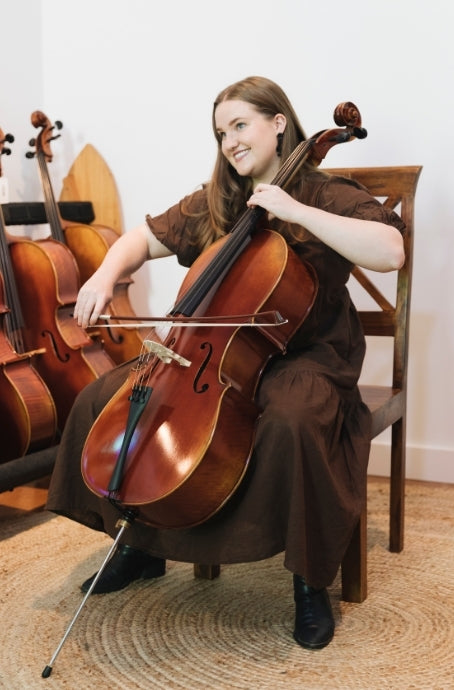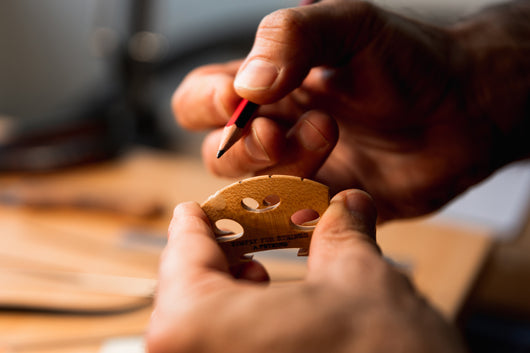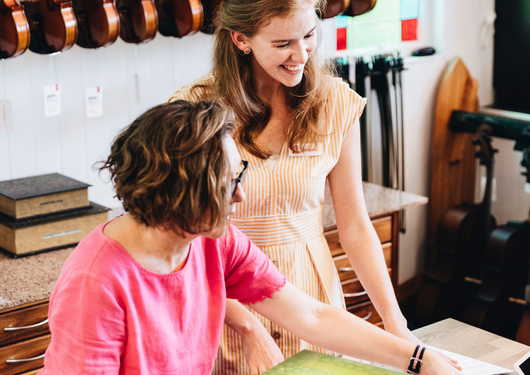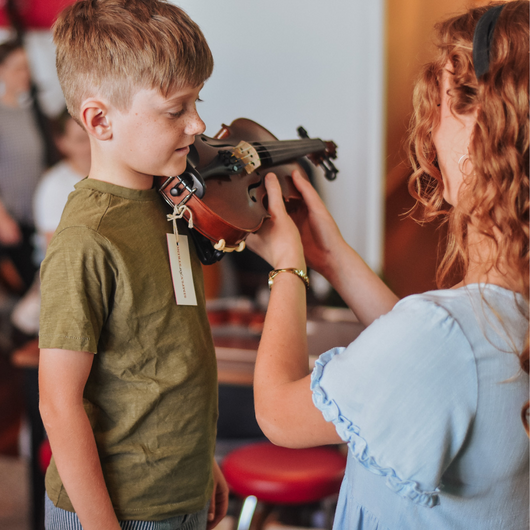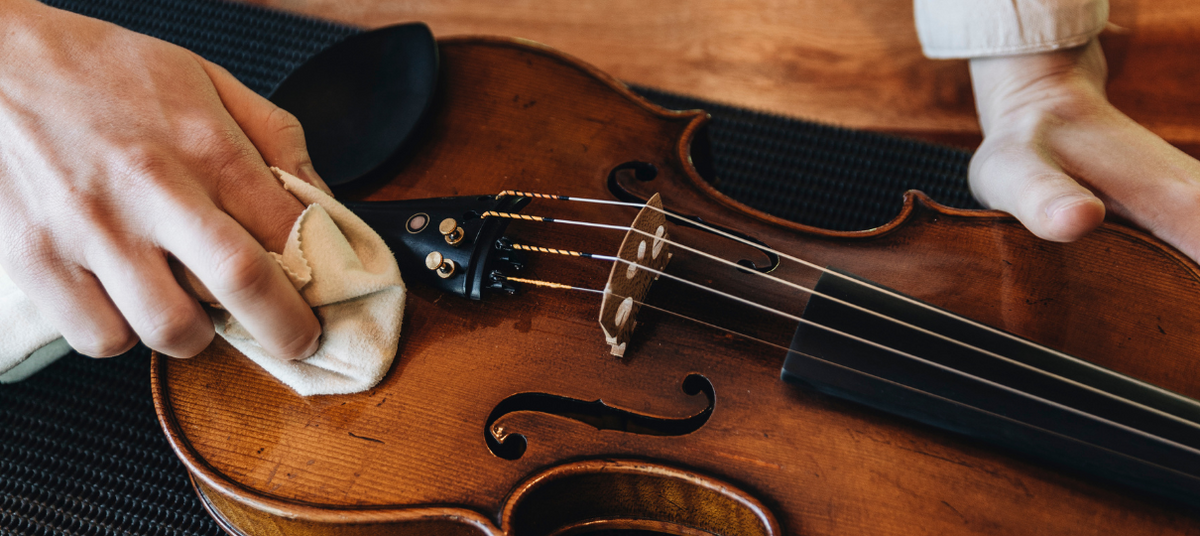Keeping your instrument clean and healthy is the key to a great sound and a long and happy playing life. With just a little thoughtfulness and quick and regular care, you can achieve many years of happy partnership with your instrument and protect your investment. Wanting to learn more about cleaning and protecting your instrument during flu season? Read on!
There are a few key things to keep in mind when it comes to keeping your instrument safe during flu season and as we adapt to life during the COVID-19 pandemic.
First things first - keep safe!
COVID-19 spreads through respiratory droplets produced when an infected person coughs or sneezes. A person can acquire the virus by touching a surface or object that has the virus on it and then touching their own mouth, nose, or eyes. This is not only the case during the coronavirus pandemic, but many of our usual winter sicknesses.
There has been conjecture about a coronavirus infection cluster that occurred at a quarantined hotel in Victoria. The government believes the cross-contamination happened when two people shared a cigarette lighter. This truly highlights the importance of protecting not only ourselves but our instruments during seasons of increased sickness.
Practise good hygiene
It’s obvious but worth repeating! Cover your coughs and sneezes; avoid touching your face, especially your nose and mouth. Try to minimise the spread of germs onto your instrument as much as possible. If you are carrying any type of sickness, don’t spread it. If others are sick, don’t let them infect you!
If you’re sick, avoid playing if possible to avoid leaving germs on the instrument. Some germs die without a human or animal host to live on, and others have been known to survive on surfaces for many days.
If you’re sick and must play, wash and sterilise your hands before and after playing. If you’re displaying cold symptoms you might want to consider wearing a mask while playing. If others are sick, keep away from them and keep your instrument (with all its accessories) away from them. Distance is one of the best ways to stop the spread of sickness.
Safe Work Australia has some great advice for workplaces that are transferable to daily life.
Good hygiene also requires everyone at the workplace to, at all times:
- cover their coughs and sneezes with their elbow or a clean tissue (and no spitting)
- avoid touching their face, eyes, nose, and mouth
- dispose of tissues and cigarette butts hygienically, e.g. in closed bins
- wash and dry their hands completely before and after smoking a cigarette
- wash and dry their hands completely before and after interacting with clients
- clean and disinfect shared equipment and plant after use, including the basin area
- wash body, hair (including facial hair) and clothes thoroughly every day
- have no intentional physical contact, for example, shaking hands and patting backs. Workers should tie hair back to prevent it from touching the client.
Read our blog post all about maintaining your instrument.
Points of Contact
We don’t often stop to consider how many points of contact we make with our instruments. With these following points of contact in mind, it is best to try to avoid sharing instruments.
- Bow: The bow is held in your hand. Much transference of disease is through hand contact, because we perform so many functions with them, unconsciously touching our faces many times throughout the day.
- Chinrest: This one is a biggie - From your breath to your skin. Your chinrest harbours plenty of bacteria and anything else that’s in the skin on your chin and cheeks, plus potential bacteria from coughing and sneezing.
- The instrument itself: Depending on what you play, part of the instrument is very close to your face. For cellos and basses, that is the neck and fingerboard, where hands touch. The fingerboard and neck are very close to your nose and mouth. For violins and violas, the main body is within breathing distance of your nose and mouth.
- Case: We often hold our cases when carrying them to and from lessons. However, it may not be the first thing we think of disinfecting.

How to Keep Your Instrument Clean
BODY (including neck, scroll and pegbox; tailpiece and chinrest if made of wood)
When sickness is around, wipe the instrument thoroughly after every use. Wash your cleaning cloth regularly and don’t share it. We recommend cleaning the instrument (and bow stick/frog) with Old Wood Italian Cream.
Shop Old Wood Italian Cream with fast shipping Australia wide!
For the correct instrument’s cleaning, we highly recommend removing any dust from the area where the product will be applied. Put a few drops of the product on lint-free clean cotton or microfiber cloth. Spread it over the instrument’s surface while applying a small amount of pressure. Rub in small circular movements. Finally, rub gently with a clean cloth until no visible residues are left. Especially during flu season and the coronavirus pandemic, we recommend cleaning your instrument with the Italian Cream Ag+ after every use or after a deep cleaning or restoration.
Some violin cleaning products such as Viol may be helpful in cleaning away dirt and some germs, especially if they have citrus oils in them. Again, use sparingly and make sure you wipe off every trace of the cleaning product. They are great for cleaning, but if they’re not wiped away fully they will bond with your varnish and become part of your next cleaning problem.
A note on soap and detergents. We have seen some suggest the use of low-grade soap or gentle dishwashing detergents and a damp cloth. Although we agree that desperate times can call for desperate measures, unless the instrument has been exposed to serious infection (such as a child with a diagnosed virus sneezing all over it!), and unless the instrument has a sprayed-on synthetic varnish, do not use a low-grade soap or dishwashing detergent. It could potentially permanently damage your instrument and its varnish.
FINGERBOARD
The fingerboard is unvarnished ebony, so has no varnish to worry about. As long as you are very careful to not touch any varnish on the neck or body, you can clean the fingerboard with a sanitising wipe. We recommend you fold the wipe into a neat, small pad that won’t flop over to risk touching the varnish, then slide it up and down the fingerboard underneath the strings.
STRINGS
For everyday string care and your health, strings should be wiped thoroughly with your cleaning cloth after playing. We advise that this cloth is washed regularly.
Scientific studies have shown that everything in our skin can end up inside the strings when our fingers are playing on them, facilitated by our natural oils and perspiration. All cleaning products are also able to seep inside the outer windings of the string, therefore string manufacturers advise against ever using cleaning products on your strings. This includes alcohol products. They may seem safe but tests performed with dyed cleaning alcohol proved that it can travel inside through two layers of metal winding and into the inner core.
All foreign matter that permeates the strings will cause the interior to stiffen and affects the sound over time. Dirty strings deteriorate more quickly, costing you sound quality and more frequent expensive replacement. This foreign matter comes both from your skin, and from excess rosin - remember, rosin melts when it’s heated, and friction from the bow creates heat.
In times of sickness, of course, it may be wise to use an isopropyl alcohol wipe on the strings and risk more frequent replacement. The “lesser of two evils” would be string damage compared with the spread of disease. Better to have to buy new strings than risk spreading or catching a nasty illness that sidelines you.
BOW
Wipe down the stick and frog of your bow every time you play (sickness aside, this is always a good habit to get into!) Put your cleaning cloths in the washing machine regularly If you or others nearby are sick, wash your cloth even more frequently.
If disease is prevalent, use Old Wood Italian Cream AG+, which is certified as microbial, on the stick and frog. Make sure you don’t get the polish on your bow hair.
CASE
In times of widespread sickness, it could be wise to wipe your case over as often as you feel the need. If it’s a true hard case, you can use a gentle antibacterial spray, then wipe off. Many cases will happily handle a sponge with warm, soapy water. Some cases may also be safe to clean with isopropyl alcohol wipes.
We recommend that you vacuum your case out regularly, which also helps prevent bow bugs. Use your common sense in choosing which method is most suitable, based on the material and surface of your case.
Shop all Instrument Care and Cleaning Accessories.
We hope you find these cleaning and protection tips helpful. If you need some more cleaning tips or some personalised advice, the Simply for Strings team is always here any time to help you maintain your instrument. Contact us today!

